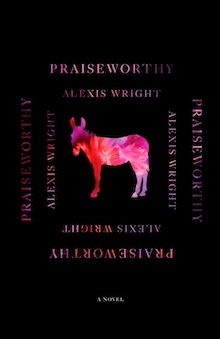Season 22 of the Two Month Review: “Praiseworthy” by Alexis Wright
It’s almost time for the next season of the Two Month Review to get underway! We announced the book—Praiseworthy by Alexis Wright—but here, at long last, is the official schedule and some background information.
 I’m going to be completely honest here: All I’ve read by Wright is the first 58 pages of Carpentaria, the other book of hers that New Directions released this month, and the first time I even heard about her was on Twitter, where there’s a very active and brilliant community of Australian readers interested in international literature.
I’m going to be completely honest here: All I’ve read by Wright is the first 58 pages of Carpentaria, the other book of hers that New Directions released this month, and the first time I even heard about her was on Twitter, where there’s a very active and brilliant community of Australian readers interested in international literature.
Which, to be honest, often makes for a great season of TMR. I’m 100% sure the book is going to be great—New Directions very very rarely publishes something I don’t love, or at least respect highly—Wright’s background is fascinating, and given that this just came out (and is referred to as her masterpiece) has that added dimension of reading more or less alongside the rest of the literary community who are intrigued by one of Australia’s most beloved contemporary writers.
If you don’t believe me in terms of that last statement, here’s a bit from last week’s profile of Wright in the New York Times:
Wright, 73, is arguably the most important Aboriginal Australian — or simply Australian — writer alive today. She is the author of epic, polyphonic novels that reveal the patience, perseverance and careful observation she learned during those long hours of note-taking, books that stretch over hundreds of pages, in which voice upon voice clamors to be heard in a dynamic swirl of the fantastic and the bleak. [. . .]
“She stands above every other person in Australian literature,” said Jane Gleeson-White, an Australian writer and critic. “What she’s doing is yet to be fully understood.”
That won’t be the case once this season is over! Brian and I are gonna break this book down, bit by bit, section by section, analyze it and . . . Or, well, at least have some fun. Long time listeners know what you’re in for. But seriously, “yet to be fully understood” is straight catnip for me (and a lot of others, I’m sure).
 But before getting to Praiseworthy itself, here’s a bit more info about Wright. From New Directions’ website:
But before getting to Praiseworthy itself, here’s a bit more info about Wright. From New Directions’ website:
Alexis Wright is a member of the Waanyi nation of the southern highlands of the Gulf of Carpentaria. The author of the prize-winning novels Carpentaria and The Swan Book, Wright has published three works of non-fiction: Take Power, an oral history of the Central Land Council; Grog War, a study of alcohol abuse in the Northern Territory; and Tracker, an award-winning collective memoir of Aboriginal leader Tracker Tilmouth. Her work has been translated into Chinese, Polish, French, and Italian. She held the position of Boisbouvier Chair in Australian Literature at the University of Melbourne between 2017–2022. Wright is the only author to win both the Miles Franklin Award (in 2007 for Carpentaria) and the Stella Prize (in 2018 for Tracker).
Since this is just a post to entice you to read and listen along, I won’t go into all the details found in these articles below (although we will discuss them on the podcast), but if you want more information about Wright herself, she appeared on The Garret Podcast a few years back, and the Sydney Morning Herald featured her in 2013, where she delivered this killer statement:
“We have to think big,” Alexis Wright says. ”We have to imagine big, and that’s part of the problem. We’re letting other people imagine and lead us down what paths they want to take us. Sometimes they’re very limited in the way their ideas are constructed. We need to imagine much more broadly. That’s the work of a writer, and more writers should look at it.”
I’m sure there will be many more reviews, interviews, features, and whatnot over the next few weeks and months, many of which we’ll do our best to incorporate into the podcast.
Now, onto Praiseworthy itself.
In a small town in the north of Australia, a mysterious haze cloud heralds both an ecological catastrophe and a gathering of the ancestors. A visionary on his own holy quest, Cause Man Steel seeks the perfect platinum donkey to launch an Aboriginal-owned donkey transport industry, saving Country and the the world from fossil fuels. His wife, Dance, seeking solace from his madness, studies butterflies and moths and dreams of repatriating her family to China. One of their sons, named Aboriginal Sovereignty, is determined to end it all by walking into the sea. Their other child, Tommyhawk, wants nothing more than to be adopted by Australia’s most powerful white woman. Praiseworthy is an epic masterpiece that bends time and reality—a cry of outrage against oppression, greed, and assimilation.
 And to give you a taste of the writing, here’s a bit from the opening of the novel:
And to give you a taste of the writing, here’s a bit from the opening of the novel:
Once upon a fine time for some people in the world, but not to plenteous, nor perfect for others, there lived a culture dreamer obsessing about the era. He was no great dreamer, no greater than the rest of the juggernauts in his heartbroken, storm-country people’s humanity. They knew just as much as he did about surviving on a daily basis, and about how to make sacrifices of themselves in all the cataclysmic times generated by the mangy dogs who had stolen their traditional land. These people, after the generations of dealing with the land-thief criminals like many others around the world, had turned themselves, not into a tangled web of despair, but into some of the best fighters of all times. They used pure guts for improving life, and said they were in it for the long run. Theirs was a sovereign world view—the main view acceptable to their governing ancestors, a law grown through belief in its own endlessness, and through re-setting the survival barometer from millennia a couple of hundred years ago, by evolving a new gauge—something like a moth’s sonar, for only hearing what it wanted to hear. But, to be frank, the facet worked like a shield, for seeing what they wanted to see of the world, or to shut the whole thing out forever. And for deciding whether they wanted to speak at all, for sometimes, this world never spoke for years, then when it did, spoke wreckage words—like a piece of heaven heavy with intent, firing on all cylinders from the sky.
So lets get lost in Australia for a couple months in this sprawling novel that includes aboriginal politics, ecological threats, characters with wonderful names (a hallmark of Carpentaria as well), hints of magical realism, and a “sprawling network of literary inspirations.”
Official schedule below, and as always, you can watch each episode live on YouTube—where you’re encouraged to comment, ask questions, make jokes—or listen on Apple Podcasts and Spotify. (I believe basically every other podcast provider—Stitcher, Google Podcasts—is gone or about to be.) And follow Two Month Review on Twitter for updates as to the specific time we’ll go live, when new episodes drop, etc.
February 29: 1-67
March 7: 68-133
March 14: No Podcast (Chad at London Book Fair)
March 21: 133-198
March 28: 198-264
April 4: 265-336
April 11: 337-400
April 18: 400-463
April 25: 463-526
May 2: 526-591
May 9: 592-661

Leave a Reply